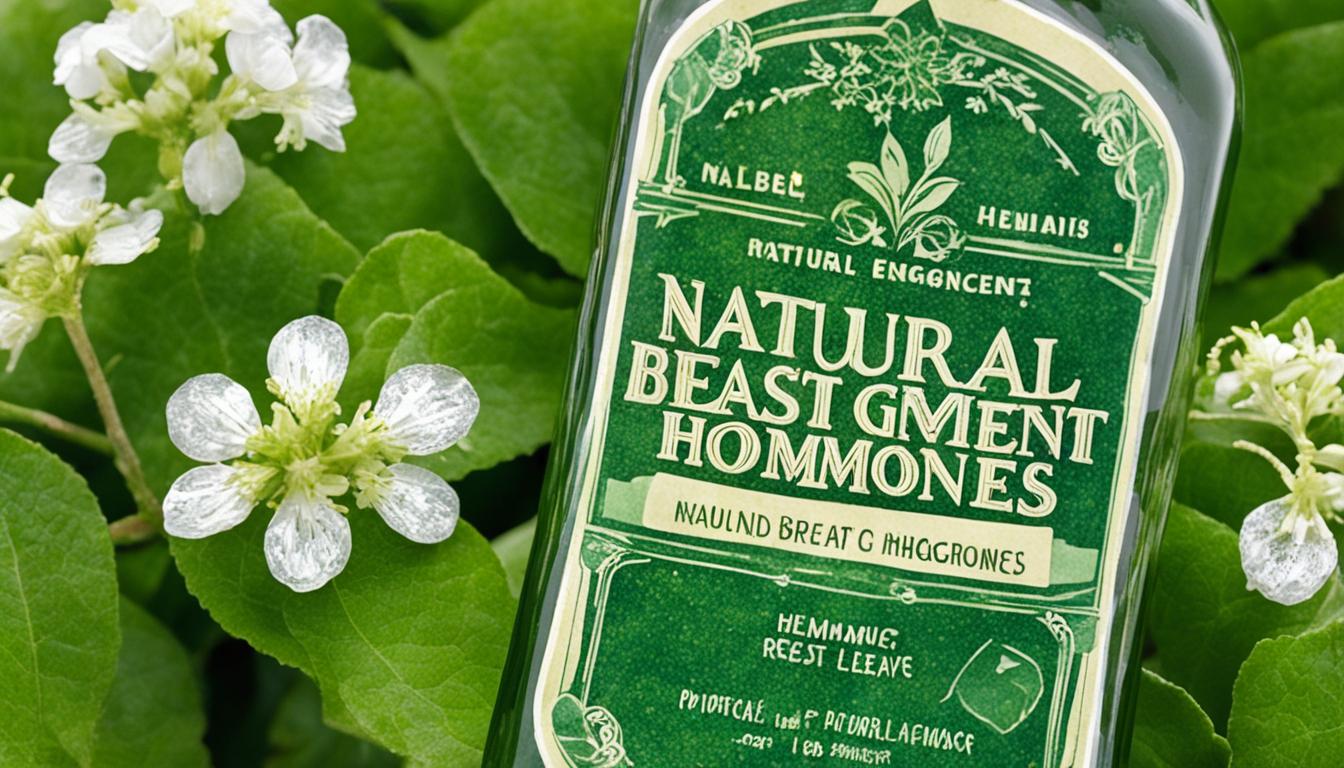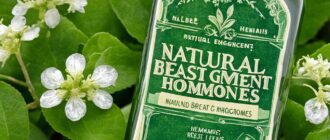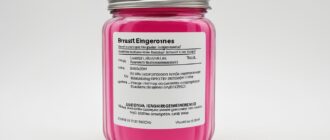The information provided in this article is intended for educational purposes only and should not be construed as medical advice. Although the author is a medical professional, the information presented here does not establish a doctor-patient relationship. Always consult with a qualified healthcare provider before making any decisions about your health or treatment
Welcome to our comprehensive guide on natural breast enlargement hormones. In this guide, we will explore the various hormones involved in breast growth and delve into both natural and medical approaches to enhancing breast size. Whether you are looking to understand the science behind hormone therapy or seeking alternative methods for breast growth, this guide will provide you with valuable insights and essential information.
When it comes to natural breast growth, hormones play a crucial role. Hormones such as estrogen and progesterone are responsible for the development and growth of breast tissue. Understanding how these hormones work and their influence on the breasts can help you make informed decisions about enhancing your breast size.
While hormone therapy is a popular method for breast enlargement, it is essential to consider the risks and potential side effects associated with these interventions. We will explore the science behind hormone therapy and discuss the importance of medical supervision and safe administration.
Additionally, we will debunk common myths and misconceptions surrounding breast enlargement hormones, as well as provide information about alternative methods that do not involve hormone therapy. From exercises to dietary choices, there are natural approaches that can support breast growth.
Moreover, we will discuss the psychological impact of breast size on self-esteem and address the cultural and societal perceptions surrounding body image. It is crucial to focus not just on breast size, but on overall body acceptance and positivity.
Throughout this guide, we aim to empower you with accurate information and provide insights into the options available for breast growth. By understanding the role of hormones, exploring alternative methods, and considering the psychological aspects, you can make informed decisions that align with your goals and preferences.
Now, let’s dive into the fascinating world of natural breast enlargement hormones to discover the factors that influence breast growth and ways to enhance your breast size.
Contents
- 1 Understanding Breast Development and Hormonal Influences
- 2 Exploring Natural Hormones for Breast Growth
- 3 The Science Behind Hormone Therapy for Breast Enlargement
- 4 Risks and Side Effects Associated with Hormonal Interventions
- 5 Comparison of Risks and Side Effects
- 6 Alternatives to Hormone Therapy for Enhancing Breast Size
- 7 The Psychological Effects of Breast Size on Self-Esteem
- 8 Debunking Myths Around Breast Enlargement Hormones
- 9 Breast Enhancement Supplements: Facts and Fiction
- 10 The Role of Diet and Nutrition in Natural Breast Enlargement
- 11 Hormone Levels and Breast Changes During Pregnancy
- 12 Impact of Aging and Menopause on Breast Tissue
- 13 Finding the Right Medical Support for Hormonal Treatments
- 14 Legal and Ethical Considerations in Hormone Therapy
- 15 Conclusion
- 16 Source Links
Key Takeaways:
- Understanding the role of hormones such as estrogen and progesterone in breast development
- Exploring natural hormone options and supplements for breast growth
- The science behind hormone therapy for breast enlargement and the importance of medical supervision
- Considering the potential risks and side effects associated with hormonal interventions
- Exploring alternative methods and lifestyle factors that can support natural breast growth
Understanding Breast Development and Hormonal Influences
The growth and development of breasts are influenced by various hormones, particularly estrogen and progesterone. These hormones play vital roles in shaping breast tissue and ensuring proper functioning throughout different stages of life.
The Role of Estrogen and Progesterone
Estrogen is a primary hormone involved in breast development. It promotes the proliferation of breast tissue, leading to the enlargement and formation of mammary glands. Estrogen also contributes to the deposition of fat in the breasts, enhancing their size and shape.
On the other hand, progesterone is responsible for stimulating the growth of milk-producing glands and further preparing the breasts for potential pregnancy and lactation.
Puberty and the Onset of Breast Growth
During puberty, a surge in hormone production triggers breast development in females. Estrogen, produced by the ovaries, initiates the growth of breast buds, which are small, firm lumps under the nipples.
As breast tissue continues to develop, the ducts and lobules within the breasts expand to prepare for potential future breastfeeding. This growth is largely driven by estrogen, while progesterone also plays a role in preparing the breasts for potential pregnancy.
Hormones During the Menstrual Cycle and Breast Changes
The hormonal changes that occur during the menstrual cycle also influence breast changes. The levels of estrogen and progesterone fluctuate throughout the cycle, leading to cyclical breast changes in many women.
During the first half of the menstrual cycle, estrogen levels rise, promoting breast tissue growth and the development of milk ducts and lobules. In the second half of the cycle, progesterone levels increase, causing the breast tissue to become more sensitive and potentially leading to breast swelling or tenderness.
It is important to note that these breast changes during the menstrual cycle are normal variations and may differ for each individual based on their hormonal profile and overall health.
| Stage of Development | Hormonal Influences |
|---|---|
| Puberty | Estrogen stimulates breast bud formation and further development |
| Menstrual Cycle | Estrogen promotes breast tissue growth in the first half, progesterone contributes to breast sensitivity and changes in the second half |
Exploring Natural Hormones for Breast Growth
When it comes to enhancing breast size naturally, many individuals turn to natural hormones and supplements as an alternative to medical interventions. These natural options are believed to stimulate breast growth by mimicking the effects of estrogen, a hormone that plays a crucial role in breast development.
One popular approach is the use of hormone supplements, which are available in various forms such as capsules, creams, and oils. These supplements typically contain plant-derived substances that mimic the hormonal effects of estrogen in the body. Common ingredients found in hormone supplements include fenugreek, fennel seed, and wild yam extract, among others.
Herbal remedies are another avenue explored by those seeking natural breast enlargement. Certain herbs like fenugreek and fennel are believed to have estrogen-like properties, which can promote breast tissue growth. When used in the form of teas or in combination with other herbs, these remedies are thought to support the body’s natural hormonal balance and stimulate breast development.
It’s important to note that while natural hormones and supplements are often considered safe, they may not work for everyone and their effectiveness varies from person to person. Moreover, it’s crucial to consult with a healthcare professional before embarking on any hormonal or herbal regimen for breast enlargement, especially for individuals with pre-existing medical conditions or taking other medications.
Ultimately, whether to pursue natural hormones and supplements for breast growth is a personal decision. It’s essential to gather information, weigh the potential benefits and risks, and consult with a qualified professional to make an informed choice. So, if you’re considering natural methods to enhance your breast size, take the time to explore the options available and find the approach that aligns with your goals and overall well-being.
The Science Behind Hormone Therapy for Breast Enlargement
Hormone therapy is a common method used for breast enlargement, particularly for individuals seeking significant and noticeable results. This section will delve into the science behind hormone therapy and shed light on the different aspects involved in this transformative process.
Synthetic Hormones vs. Body’s Natural Production
There are two primary categories of hormones used in hormone therapy: synthetic hormones and the body’s natural hormones. Synthetic hormones, such as estrogen and progesterone, are specifically designed to mimic the effects of the hormones naturally produced by the body. These synthetic hormones are used to supplement or replace the body’s natural hormone production, aiming to achieve desired breast growth.
The body’s natural hormone production takes place in the endocrine system, where hormones are produced by glands and released into the bloodstream. Hormones play a crucial role in the development of secondary sexual characteristics, including breast growth. During puberty, the body’s hormone levels increase, triggering the development of breast tissue. Hormone therapy aims to replicate or enhance this process through the controlled administration of synthetic hormones.
Medical Supervision and Safe Hormonal Administration
It is essential to emphasize that hormone therapy should always be conducted under the guidance and supervision of a qualified medical professional, such as an endocrinologist or gynecologist. These medical experts specialize in hormone therapy and can tailor treatment plans to meet individual needs while prioritizing safety.
Safe administration of hormones involves a detailed assessment of the individual’s medical history, hormone levels, and overall health. The medical professional will consider factors such as age, existing health conditions, and any potential risks or contraindications before recommending hormone therapy. Regular monitoring and follow-up appointments are crucial to assess the individual’s response to the treatment and make any necessary adjustments to ensure optimal outcomes.
Throughout the hormone therapy process, it is crucial to prioritize safety and follow the recommended dosage and administration guidelines provided by the healthcare provider. Compliance with these guidelines helps minimize potential risks and maximize the effectiveness of the treatment for breast enlargement.
Risks and Side Effects Associated with Hormonal Interventions
In the pursuit of breast enlargement, hormonal interventions are often considered as a potential solution. While these interventions can be effective in achieving the desired outcomes, it is important to be aware of the potential risks and side effects associated with them. Understanding these risks can help individuals make informed decisions about their own breast enlargement journey.
Potential Health Complications
Hormonal interventions, such as hormone therapy, may carry certain health risks. It is crucial to acknowledge that these interventions can have varying effects on different individuals. Some potential health complications that may arise from hormonal interventions include:
- Cardiovascular problems
- Thromboembolic disorders
- Mood swings and emotional changes
- Weight gain
- Fluid retention
It is important to note that these risks may vary depending on the specific hormones used, dosage, duration of treatment, and individual health factors. Consulting with a qualified medical professional is essential to discuss and mitigate any potential health complications.
Considering Long-Term Health Implications
In addition to short-term side effects, it is crucial to consider the long-term health implications of hormonal interventions for breast enlargement. Some long-term effects that may arise include:
- Increased risk of breast cancer
- Alteration of natural hormone production
- Effects on fertility and reproductive health
- Impact on bone density and osteoporosis risk
These long-term health implications should not be taken lightly. It is essential to weigh the potential benefits of hormonal interventions against these risks and consider alternative approaches if necessary.

Comparison of Risks and Side Effects
| Hormonal Interventions | Alternative Methods | |
|---|---|---|
| Short-Term Side Effects | Cardiovascular problems Thromboembolic disorders Mood swings and emotional changes Weight gain Fluid retention |
Minimal to none |
| Long-Term Health Implications | Increased risk of breast cancer Alteration of natural hormone production Effects on fertility and reproductive health Impact on bone density and osteoporosis risk |
N/A |
While hormonal interventions may provide the desired breast enlargement results, it is essential to carefully evaluate and understand the potential risks and side effects involved. Consulting with a qualified medical professional is crucial in weighing the benefits and risks and exploring alternative methods for enhancing breast size to ensure long-term health and well-being.
Alternatives to Hormone Therapy for Enhancing Breast Size
If you’re looking to enhance your breast size but prefer non-hormonal methods, there are alternatives to hormone therapy that you can consider. These natural approaches offer potential benefits without the use of synthetic hormones. Below, we explore some popular alternatives that are believed to promote breast growth.
1. Exercises: Certain exercises, such as chest presses and push-ups, focus on strengthening the pectoral muscles underneath the breasts. While these exercises may not directly increase breast tissue, they can help enhance the appearance of your bust by providing better support and lifting.
2. Massages: Breast massages can help stimulate blood flow to the breasts and promote lymphatic drainage. Some individuals believe that regular massages can improve breast shape and size over time. It’s important to note that the effectiveness of breast massages may vary among individuals.
3. Herbal Remedies: There are herbal remedies available that are thought to support natural breast enlargement. These remedies commonly contain ingredients such as fenugreek, fennel, wild yam, and saw palmetto, which are believed to have estrogenic properties. It’s important to consult with a healthcare professional before using any herbal supplements to ensure they are safe for you.
To visualize these alternative methods, take a look at the diagram below:
| Alternative Methods | Effectiveness | Considerations |
|---|---|---|
| Exercises | Varies – may enhance appearance | Consistent and proper technique is important |
| Massages | Effectiveness varies among individuals | Consult a professional for proper technique |
| Herbal Remedies | Effectiveness varies among individuals | Consult a healthcare professional for safety |
It’s important to note that the effectiveness of these alternatives may vary from person to person. Results may take time to manifest, and individual experiences may differ. If you’re considering any of these non-hormonal methods, it’s always advisable to consult with a healthcare professional who can provide personalized guidance based on your needs and health profile.
The Psychological Effects of Breast Size on Self-Esteem
Understanding the psychological impact of breast size on self-esteem is crucial in addressing body image issues and promoting body acceptance and positivity. Cultural perceptions play a significant role in shaping our views on breast size and personal satisfaction. However, it is essential to recognize that beauty standards vary across societies and should not be the sole determinant of self-worth.
For many individuals, breast size is intricately linked to their sense of femininity, attractiveness, and body confidence. Society’s emphasis on larger breasts as the epitome of beauty can lead to feelings of inadequacy and low self-esteem among those with smaller breasts. This can contribute to body image concerns, anxiety, and a distorted perception of one’s own physical appearance.
Addressing body image issues goes beyond focusing solely on breast size. It requires a comprehensive approach that challenges societal beauty standards and promotes body acceptance and positivity at all sizes. Body acceptance emphasizes embracing oneself as a whole, acknowledging and celebrating the uniqueness of each individual’s body.
Body positivity encourages individuals to love and accept their bodies, irrespective of societal expectations or physical features. It promotes self-love, self-care, and the understanding that beauty comes in diverse forms. By fostering body acceptance and positivity, individuals can develop a healthier relationship with their bodies, including their breasts, and cultivate higher levels of self-esteem.
Debunking Myths Around Breast Enlargement Hormones
There are many myths and misconceptions surrounding breast enlargement hormones. It’s important to separate fact from fiction and dispel any false beliefs or misinformation that individuals may have about the effectiveness or safety of hormonal interventions for breast enlargement.
One common myth is that taking breast enlargement hormones will automatically result in substantial breast growth. In reality, the effects of hormones on breast size vary from person to person. Hormones can play a role in breast development, but they may not be the only factor influencing breast growth. Genetic factors, overall health, and individual hormone levels can also impact breast size.
Another misconception is that hormone therapy is the sole option for breast enlargement. While hormone therapy can be effective for some individuals, there are also natural alternatives and non-hormonal methods that can promote breast growth. It’s important to explore all available options and consult with a healthcare professional to determine the best approach for your unique needs.
“It’s important to separate fact from fiction and dispel any false beliefs or misinformation about the effectiveness or safety of hormonal interventions for breast enlargement.”
One of the main hormone therapy myths is that it is completely risk-free. Like any medical intervention, hormone therapy for breast enlargement carries certain risks and potential side effects. It’s crucial to work with a qualified healthcare provider who can monitor your hormone levels and ensure safe administration of hormones. Regular follow-up appointments and ongoing medical supervision are essential for minimizing risks and maximizing the benefits of hormone therapy.
Breast Enhancement Supplements: Facts and Fiction
In the quest for natural breast enlargement, many individuals turn to breast enhancement supplements as a non-invasive option. However, it’s essential to separate facts from fiction when considering the efficacy and limitations of these over-the-counter supplements.
Efficacy of Over-The-Counter Supplements
There is a wide range of breast enhancement supplements available on the market, promising to promote breast growth and enhance size naturally. While some individuals may report positive results, it’s important to approach these claims with caution.
The efficacy of over-the-counter supplements in promoting breast growth is not widely supported by scientific evidence. Many of these supplements rely on herbal ingredients that are believed to have hormone-like effects on the body, such as fenugreek, fennel, and wild yam. However, the effectiveness of these ingredients in stimulating breast tissue growth is still a subject of debate among experts.
It’s worth noting that the results of breast enhancement supplements can vary significantly from person to person. Factors such as individual body chemistry, genetic predisposition, and overall health can influence the response to these supplements. It’s essential to set realistic expectations and approach these supplements as a complementary approach rather than a guaranteed solution.
Understanding the Limitations of Phytoestrogens
Phytoestrogens, naturally occurring compounds found in certain plants, are often a key component of breast enhancement supplements. These compounds are believed to mimic the effects of estrogen in the body and promote breast growth. However, it’s important to understand the limitations of phytoestrogens in achieving significant breast enlargement.
While phytoestrogens may have mild estrogenic effects, their potency is much lower compared to the estrogen produced by the human body. Therefore, relying solely on phytoestrogens for breast enlargement may not yield substantial results. Additionally, the effects of phytoestrogens can vary depending on the individual’s hormonal balance and metabolism.
It’s crucial to approach herbal supplements containing phytoestrogens with caution. Their safety and long-term effects are not well-studied, and they may interact with medications or have potential side effects. Before incorporating these supplements into your routine, it’s advisable to consult with a healthcare professional to ensure they are suitable for you.

Regulation and Safety Considerations
When considering breast enhancement supplements, it’s important to be mindful of the regulation and safety considerations surrounding these products.
Unlike pharmaceutical drugs, over-the-counter supplements are not subject to the same stringent regulations and testing requirements. The quality, purity, and labeling accuracy of these supplements can vary significantly between brands. It’s crucial to choose reputable brands that adhere to good manufacturing practices and have undergone independent third-party testing.
Additionally, it’s essential to be aware of any potential allergies or sensitivities to the ingredients used in these supplements. Always read the labels carefully and consult with a healthcare professional if you have any underlying health conditions or concerns.
In conclusion, breast enhancement supplements can be an attractive option for individuals seeking natural remedies for breast growth. However, it’s important to recognize that the efficacy of these supplements is not guaranteed, and results can vary. It’s advisable to approach them as a complementary approach and consult with a healthcare professional for guidance tailored to your specific needs and circumstances.
The Role of Diet and Nutrition in Natural Breast Enlargement
When it comes to natural breast enlargement, diet and nutrition play a crucial role in supporting breast growth. The foods we consume can have a direct impact on hormone levels, overall health, and breast tissue development. By incorporating the right nutrients into your diet, you can optimize your body’s natural processes and enhance your chances of achieving natural breast growth.
One key factor to consider is the inclusion of foods that are rich in estrogen-like compounds, such as phytoestrogens. These compounds mimic the effects of estrogen in the body and can promote breast tissue growth. Some examples of foods that are high in phytoestrogens include soybeans, flaxseeds, chickpeas, lentils, and fenugreek.
In addition to phytoestrogens, certain vitamins and minerals are also important for supporting breast health and growth. Vitamin C, for example, is known for its role in collagen production, which helps maintain the elasticity of breast tissue. Foods rich in vitamin C include citrus fruits, strawberries, bell peppers, and broccoli.
Furthermore, incorporating protein-rich foods into your diet is essential for supporting breast cell development and repair. Opt for lean sources of protein, such as chicken, fish, tofu, and Greek yogurt. These foods not only provide the necessary building blocks for breast tissue growth but also support overall muscle health.
Hydration is another crucial factor in promoting breast health and growth. Drinking an adequate amount of water throughout the day helps maintain the overall health of breast tissue and ensures optimal bodily functions. Aim to drink at least eight glasses of water per day to stay properly hydrated.
In addition to specific foods, maintaining a balanced and varied diet is key. Eating a wide range of fruits, vegetables, whole grains, and lean proteins provides your body with the necessary nutrients for overall health and wellness. This holistic approach to nutrition supports hormone balance, cellular function, and breast tissue development.
It’s important to note that while diet and nutrition can support natural breast enlargement, individual results may vary. It’s always recommended to consult with a healthcare professional or registered dietitian for personalized advice that takes into consideration your unique nutritional needs and goals.
By adopting a diet rich in phytoestrogens, essential nutrients, and hydration, you can support your body’s natural processes and optimize your chances of achieving natural breast growth. Combined with other lifestyle factors such as exercise and proper self-care, a balanced diet can contribute to overall breast health and enhance your confidence and well-being.
Hormone Levels and Breast Changes During Pregnancy
During pregnancy, hormone levels undergo significant changes, leading to various transformations in the breasts. These hormonal fluctuations play a crucial role in preparing the breasts for lactation and nurturing the growing fetus.
Milk Duct Development and Preparation for Lactation
One of the key effects of hormonal changes during pregnancy is the development and preparation of the milk ducts for lactation. The hormone prolactin stimulates the growth and branching of the milk ducts, ensuring that they can deliver milk efficiently once the baby is born.
Additionally, another hormone called progesterone helps prepare the breasts for lactation by promoting the growth of specialized cells within the milk ducts, known as alveoli. These cells are responsible for producing and storing milk.
Hormonal Fluctuations from Conception to Birth
From conception to birth, pregnancy is characterized by significant hormonal fluctuations. The hormone levels rise rapidly, especially during the first trimester, and gradually stabilize as pregnancy progresses.
Estrogen and progesterone, the two dominant hormones during pregnancy, play essential roles in breast enlargement and development. Estrogen stimulates the growth of breast tissue and increases blood flow to the breasts, resulting in their increased size and sensitivity. Progesterone, on the other hand, supports the development of the milk-producing glands in the breasts.
These hormonal changes contribute to various notable breast changes during pregnancy, such as increased breast size, darkening of the nipples, and heightened breast tenderness.
It is important to note that the extent of breast changes experienced during pregnancy can vary from woman to woman. Factors like genetics, age, and overall health can influence the degree of hormonal effects on the breasts.
Impact of Aging and Menopause on Breast Tissue
Aging and menopause bring about significant changes in a woman’s body, including the breast tissue. Understanding the shifts in hormone levels during this phase is essential to maintain breast health and address any concerns that may arise.
Decoding the Shifts in Hormone Levels
During menopause, the production of estrogen and progesterone decreases. This hormonal shift can lead to various changes in the breast tissue, such as a decrease in breast density and an increase in fatty tissue. These changes may affect the size, shape, and overall appearance of the breasts.
Additionally, the decline in estrogen levels can cause the breasts to become less firm and more susceptible to sagging. Reduced elasticity may also contribute to the formation of wrinkles and fine lines on the chest area.
Adapting to Changes and Maintaining Breast Health
While the changes in breast tissue during menopause are a natural part of the aging process, there are steps that women can take to maintain breast health:
- Regular breast self-exams: Performing monthly breast self-exams can help women detect any changes or abnormalities in their breasts. If any concerns arise, it is important to consult with a healthcare professional.
- Screening mammograms: Women should continue to schedule regular mammograms as recommended by their healthcare provider. Mammograms can help detect breast cancer at an early stage when treatment is most effective.
- Healthy lifestyle choices: Eating a balanced diet, engaging in regular physical activity, and avoiding smoking and excessive alcohol consumption can contribute to overall breast health.
- Seeking medical advice: If women experience any unusual breast changes or discomfort, it is important to seek medical advice. A healthcare professional can provide guidance and recommend appropriate interventions or treatments if necessary.
Common Hormonal Changes During Menopause
| Hormone | Effect on Breast Tissue |
|---|---|
| Estrogen | Decreased production can lead to a decrease in breast density and firmness. |
| Progesterone | Reduced levels can contribute to changes in breast shape and size. |
| Fatty Tissue | Increased amounts of fatty tissue may result in breast enlargement. |
By understanding the impact of aging and menopause on breast tissue and incorporating appropriate measures, women can maintain breast health and take proactive steps to address any concerns that may arise.
Finding the Right Medical Support for Hormonal Treatments
When undergoing hormonal treatments for breast enlargement, it is crucial to have the right medical support to ensure safe administration and effective monitoring of hormone therapy. This section provides guidance on selecting a qualified endocrinologist or gynecologist and understanding the importance of treatment plans and follow-ups.
Selecting a Qualified Endocrinologist or Gynecologist
When seeking medical support for hormone treatments, it is essential to choose a qualified healthcare professional with expertise in hormone therapy for breast enlargement. Look for a board-certified endocrinologist or gynecologist who specializes in hormonal interventions. They will have the knowledge and experience necessary to provide comprehensive care and guidance throughout your treatment journey.
Research potential doctors and read reviews to ensure you find a practitioner who is knowledgeable, experienced, and has a positive reputation within the medical community. It is also crucial to select a doctor who listens to your concerns, addresses your questions, and works collaboratively with you to develop a personalized treatment plan.
Understanding Treatment Plans and Follow-Ups
Once you have selected a qualified healthcare professional, it is essential to understand the treatment plan and follow-up care involved in hormone therapy for breast enlargement. Your doctor will assess your specific needs, medical history, and desired outcomes to create an individualized treatment plan.
The treatment plan may involve the administration of hormones, either through oral medication or transdermal application, depending on your specific requirements. Your doctor will guide you through the process, ensuring that the hormones are safely administered and monitored to achieve the desired breast enlargement effect.
Regular follow-up appointments are crucial for monitoring and adjusting hormone therapy as needed. These appointments allow your doctor to assess the effectiveness of the treatment and address any concerns or side effects that may arise. They also provide an opportunity for you to discuss your progress, ask questions, and receive ongoing guidance and support.
| Benefits of Qualified Medical Support for Hormonal Treatments |
|---|
| 1. Expertise in hormone therapy for breast enlargement |
| 2. Personalized treatment plans based on individual needs |
| 3. Safe administration and monitoring of hormone therapy |
| 4. Ongoing follow-up care and support |
| 5. Addressing concerns and adjusting treatment as needed |
Having the right medical support for hormone treatments is essential for achieving safe and effective breast enlargement. By selecting a qualified endocrinologist or gynecologist and understanding the treatment plans and follow-up care involved, you can embark on your hormone therapy journey with confidence and peace of mind.
Legal and Ethical Considerations in Hormone Therapy
When considering hormone therapy for breast enlargement, it is essential to understand the legal and ethical considerations involved. These considerations not only pertain to the regulations and restrictions surrounding hormone treatments but also delve into the ethical implications of undergoing such interventions.
Regulations for hormone treatments may vary depending on the country or state in which you reside. It is crucial to familiarize yourself with the legal requirements and guidelines to ensure compliance and safety. Consulting with a qualified endocrinologist or gynecologist who specializes in hormone therapy can provide valuable insights into the legal considerations specific to your location.
Furthermore, ethical implications must be taken into account when making decisions about hormone therapy. It is essential to consider the potential risks and benefits associated with these treatments and weigh them against your personal values and beliefs. Additionally, confidentiality and privacy concerns related to hormone therapy should be discussed with medical professionals to ensure your comfort and peace of mind.
By understanding the legal and ethical considerations, you can make informed decisions about hormone therapy for breast enlargement while prioritizing your well-being and adhering to applicable regulations.
Conclusion
In conclusion, understanding the role of hormones in breast development and exploring the various options for natural breast enlargement is key to making informed decisions about enhancing breast size. Throughout this guide, we have discussed the importance of estrogen and progesterone in breast growth, as well as the changes that occur during puberty, the menstrual cycle, pregnancy, and menopause.
While hormone therapy can be an effective option for breast enlargement, it is essential to consider the risks and side effects associated with these interventions. Alternatives to hormone therapy, such as exercises, massages, and dietary changes, offer non-hormonal approaches to enhancing breast size.
Ultimately, the decision to pursue breast enlargement is a personal one, and it is crucial to navigate the available options with careful consideration. By making empowered choices based on accurate information, individuals can explore the various methods for breast growth and select the approach that aligns with their goals and preferences.
Source Links
- https://www.mayoclinic.org/healthy-lifestyle/womens-health/expert-answers/natural-breast-enhancement/faq-20057834
- https://www.allohealth.care/healthfeed/sexual-wellness/can-i-take-hormones-to-grow-breasts
- https://www.hopkinsmedicine.org/health/conditions-and-diseases/normal-breast-development-and-changes
Experience:
-20 years of expertise in the field of plastic surgery, including 15 years specializing in breast augmentation.
-Member of the American Society of Plastic Surgeons (ASPS).
-Recipient of the American Society of Plastic Surgeons Award for Achievements in Breast Augmentation.
Education:
-Doctor of Medicine, University of California, San Francisco.
-Residency in Plastic Surgery, University of California, Los Angeles.
Professional Skills:
-Proficient in various breast augmentation techniques, including implants, autologous fat transfer, and rib grafts.
-Utilizes cutting-edge methods and technologies to ensure optimal results.
-Understands the individual needs of each patient, assisting them in achieving their desired outcomes.
Specializations:
-Breast Augmentation
-Breast Correction
-Liposuction
-Facelift
Description:
Dr. Emily Johnson is a seasoned plastic surgeon with 20 years of experience, specializing in breast augmentation. A member of the American Society of Plastic Surgeons, she has been honored with the ASPS Award for her achievements in breast augmentation. Dr. Johnson employs advanced methods and technologies to ensure the best outcomes for her patients. She understands the unique needs of each individual, guiding them towards their desired results.
Disclaimer:
The information provided on this page about breast augmentation surgical procedures is intended for informational purposes only. It is not intended to be a substitute for professional medical advice, diagnosis, or treatment. Always consult with a qualified healthcare professional for personalized advice and guidance on breast augmentation.
Risks and Complications:
Breast augmentation surgery is a major surgical procedure with potential risks and complications. These risks include infection, bleeding, scarring, implant rupture, and changes in breast sensation. It is important to discuss these risks with your doctor before making a decision about breast augmentation surgery.
Consult a Qualified Medical Professional:
If you are considering breast augmentation surgery, it is important to consult with a qualified medical professional. A qualified plastic surgeon can provide you with personalized advice and guidance on the risks, benefits, and alternatives to breast augmentation surgery. They can also help you choose the right type of breast implant and surgical technique for your individual needs and goals.








